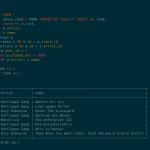MySQL has an aes_encrypt/aes_decrypt pair of functions (Encryption and Compression Functions) that enable encryption and decryption of data using the official AES algorithm.
The functions are easy to use (select AES_ENCRYPT(‘text’,’password’)) and the result is easy to store (insert into secrets values HEX(AES_ENCRYPT(‘text’,’password’))) as hex values.
I used this technique for a while but i wanted to have a more database agnostic version of this encryption and tried to build the same methods with java.
Although it was relatively easy to find the exact cipher mode (which is AES/ECB/PKCS5Padding), i had a real hard time figuring out how the key is calculated from the given password (the key must be 16bytes long, per default MySql uses AES-128). It turns out that the MySQL algorithm just or’s the bytes of a given passphrase against the previous bytes if the password is longer than 16 chars and just leaves them 0 when the password is shorter than 16 chars. So you can generate a secret key spec in Java for an aes_encrypt/decrypt compatible cipher like so:
import java.io.UnsupportedEncodingException; import javax.crypto.Cipher; import javax.crypto.spec.SecretKeySpec; import org.apache.commons.codec.binary.Hex; public class Demo { public static SecretKeySpec generateMySQLAESKey(final String key, final String encoding) { try { final byte[] finalKey = new byte[16]; int i = 0; for(byte b : key.getBytes(encoding)) finalKey[i++%16] ^= b; return new SecretKeySpec(finalKey, "AES"); } catch(UnsupportedEncodingException e) { throw new RuntimeException(e); } } public static void main(String... args) throws Exception { // Decrypt final Cipher decryptCipher = Cipher.getInstance("AES"); decryptCipher.init(Cipher.DECRYPT_MODE, generateMySQLAESKey("your super secret passphrase", "UTF-8")); System.out.println(new String(decryptCipher.doFinal(Hex.decodeHex("56A34D7AB6225616799F6559AA388F07C2C9E53983111BDD5F49F36461AAD789".toCharArray())))); // Encrypt final Cipher encryptCipher = Cipher.getInstance("AES"); encryptCipher.init(Cipher.ENCRYPT_MODE, generateMySQLAESKey("your super secret passphrase", "UTF-8")); System.out.println(String.format("Select aes_decrypt(unhex('%s'), 'your super secret passphrase');", new String(Hex.encodeHex(encryptCipher.doFinal("Hallo nach Aachen".getBytes("UTF-8")))))); } } |
You need Commons Codec to run these.
This isn’t probably the most secure solution from a cryptographic point of view but it just replicates the built-in MySql function for other databases or just for interoperability. I hope to save someone else time with this as i spent about days about those view lines.






13 comments
Thanks so much for this! I’ve been pulling my hair out for two days looking for a way to replicate mysql’s encryption in java. Worked like a charm.
Hi Christopher,
i know that feeling to well 😉
You’re welcome.
I’ve just added a flattr button to this blog, maybe you’re the first to try it.
Happy halloween 🙂
Thank you for posting this! I implemented an encryption routine in Pentaho Data Integrator, and I could not figure out why I couldn’t decrypt from MySQL. This was it.
You’re welcome John, thanks for your feedback.
Thanks for providing the code. Saved me Time 😀
You’re welcome!
Wow that worked. Thank you!
Two questions:
1. When you say “or’s”, did you mean “xor’s”?
2. It turns out that the MySQL algorithm just or’s the bytes of a given passphrase against the previous bytes if the password is longer than 16 chars and just leaves them 0 when the password is shorter than 16 chars. – according to this https://dev.mysql.com/doc/refman/8.0/en/encryption-functions.html#function_aes-encrypt – it seems that the length is not always 16. What do you think?
Thanks mate! Looking for a Scala implementation of this
Awesome! It gives me a great help. Thanks for your work
Hi. This is very helpful. But what would need to be done if the mysql functions used an initialization vector? Like so:
mysql> SET @crypt_str = AES_ENCRYPT(‘text’,@key_str,@init_vector);
mysql> SELECT AES_DECRYPT(@crypt_str,@key_str,@init_vector);
I need a way in java to decrypt data encrypted this way in java. Thank you.
Thanks so much for this! working for me
My pleasure, thanks for your feedback.
One Trackback/Pingback
[…] and aes_decrypt(). Of course the MySQL implementation is not standard, so it took some research online to come up with code that looks like […]
Post a Comment